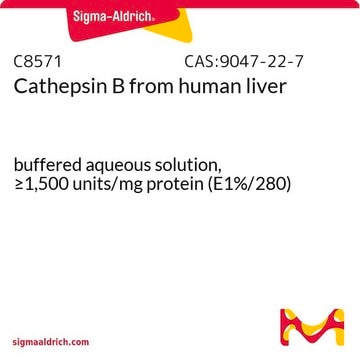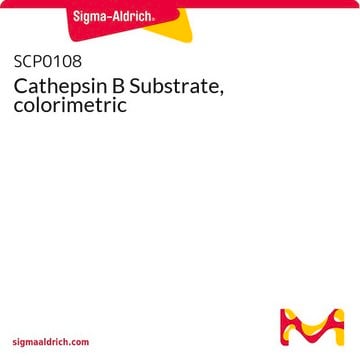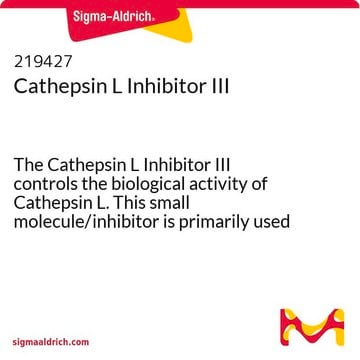219385
Cathepsin B Inhibitor II
The Cathepsin B Inhibitor II controls the biological activity of Cathepsin B. This small molecule/inhibitor is primarily used for Protease Inhibitors applications.
Sinónimos:
Cathepsin B Inhibitor II, Ac-LVK-CHO
Iniciar sesiónpara Ver la Fijación de precios por contrato y de la organización
About This Item
Fórmula empírica (notación de Hill):
C19H36N4O4
Peso molecular:
384.51
UNSPSC Code:
12352200
NACRES:
NA.77
Productos recomendados
Quality Level
assay
≥95% (HPLC)
form
solid
manufacturer/tradename
Calbiochem®
storage condition
OK to freeze
color
white
solubility
water: 1 mg/mL
shipped in
ambient
storage temp.
−70°C
General description
A more active lysinal analog of Leupeptin (Cat. No. 108975). A more potent inhibitor of cathepsin B (IC50 = 4 nM) compared to leupeptin (IC50 = 310 nM).
Lysinal analog of Leupeptin (Cat. No. 108975). A more potent inhibitor of cathepsin B (IC50 = 4 nM) than of leupeptin (IC50 = 310 nM). Note: this peptide forms cyclic isomers.
Note: this peptide forms cyclic isomers.
Biochem/physiol Actions
Cell permeable: no
Primary Target
cathepsin B
cathepsin B
Product does not compete with ATP.
Reversible: no
Target IC50: 4 nM against cathepsin B
Warning
Toxicity: Standard Handling (A)
Sequence
Ac-Leu-Val-lysinal
Reconstitution
Following reconstitution aliquot and freeze (-70°C). Stock solutions are stable for up to 1 month at -70°C.
Other Notes
McConnell, R.M., et al. 1993. J. Med. Chem. 36, 1084.
Legal Information
CALBIOCHEM is a registered trademark of Merck KGaA, Darmstadt, Germany
Storage Class
11 - Combustible Solids
wgk_germany
WGK 1
flash_point_f
Not applicable
flash_point_c
Not applicable
Certificados de análisis (COA)
Busque Certificados de análisis (COA) introduciendo el número de lote del producto. Los números de lote se encuentran en la etiqueta del producto después de las palabras «Lot» o «Batch»
¿Ya tiene este producto?
Encuentre la documentación para los productos que ha comprado recientemente en la Biblioteca de documentos.
Los clientes también vieron
Gustavo Monteiro Viana et al.
International journal of molecular sciences, 21(4) (2020-02-26)
Mucopolysaccharidosis type I (MPS I) is caused by genetic deficiency of α-l-iduronidase and impairment of lysosomal catabolism of heparan sulfate and dermatan sulfate. In the brain, these substrates accumulate in the lysosomes of neurons and glial cells, leading to neuroinflammation
Nuestro equipo de científicos tiene experiencia en todas las áreas de investigación: Ciencias de la vida, Ciencia de los materiales, Síntesis química, Cromatografía, Analítica y muchas otras.
Póngase en contacto con el Servicio técnico











